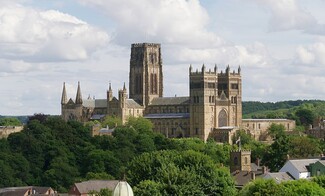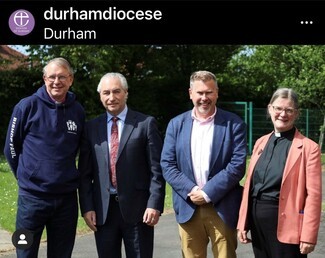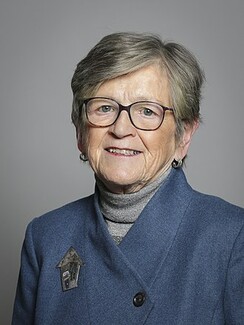We will give sanctuary to Travellers on our land – say Durham clergy

“It is a lifeline from God,” said a delighted Gypsy leader Billy Welch, who spoke to the Durham Synod.
Travelling communities are to be offered safe havens for their caravans on church land.
The move is a response to a critical nationwide shortage of sites and new legislation designed to give police new powers to move on encampments on unregistered land.
A pilot scheme, agreed unanimously by Durham’s Diocesan Synod, is the first of its kind in the country.
And it is hoped that “sanctuary stopping places” will be rolled out across the country.
The Church of England General Synod passed a resolution in 2019 to challenge prejudice against Gypsy, Roma and Traveller communities (GRT). This month’s Durham Synod, attended by 200 clergy and lay members, is the first to take this practical step.
It heard an impassioned plea by Gypsy spokesman, Billy Welch, about the pressures on Travellers, before the unanimous vote to find land on which they can camp.
Mr Welch is from Darlington and Gypsies are the largest minority group in Durham. “It is a lifeline from God,” said a delighted Mr Welch after the vote.
The Bishop of Durham, the Right Reverend Paul Butler said: “Our Gypsy, Roma and Traveller community is the largest ethnic minority group in County Durham and an important part of what makes our diocese special.
“Yet for generations they have been marginalised and discriminated against. With this motion, we are pledging to work with our churches to look at ways in which we have greater contact with the community and also offer safe stopping places where possible.”

Durham is on traditional routes to Appleby Horse Fair, where 10,000 travellers from all over Europe descend on the small Pennine town in neighbouring Cumbria.
This year’s event is from June 9 to 12, delayed a week to avoid clashing with The Queen’s Platinum Jubilee celebrations.
The journey to and from the Fair is part of the spiritual experience for the travellers who rely on stopping off points to rest their animals.
But the Synod’s vote comes too late to help this year.
Durham’s chaplain to GRT, retired doctor Nicky Chater, said: “We are at the early stages of this pilot.
“We will be asking churches to look favourably on allowing Travellers to park on suitable land like meadows and car parks, which have access from the road, and to talk to local authorities about providing facilities, perhaps toilets and rubbish collection.
“There is a long tradition of Travellers finding sanctuary on church land and we want to revive that shared history.”
She said that there was a legal obligation on local authorities to provide spaces for Travellers, but at the latest count there were just 354 official transit pitches in England and Wales, with the 2011 census showing a Traveller population of 53,000. (This is most certainly an undercount and other official statistics, such as school pupil registrations, suggest that there are many times more than this – editor).
“Obviously there is a huge gap between provision and need,” said Rev Chater.

She said pressures on Travellers were about to worsen with the Police, Courts, Sentencing and Crime Bill nearing its enactment in law.
“Part 4 is about making stopping over on land you don’t own a criminal offence with fines up to £2,500, confiscation of caravans and property and even prison sentences,” she said.
“All communities have people who break laws, or fail to consider the needs of others, but we don’t categorise a whole population by the acts of a few, except when it comes to gypsies.
“We hope this pilot spreads across the country because it can help to relieve the pressure and lessen the fear for a community as important as anyone else.”
Just last week the House of Lords Public Services Committee urged the Government to include the Gypsy, Roma and Traveller communities in its levelling up programme.
The plea came after they heard “shocking” evidence that life expectancy for Gypsy and Traveller people is reported to be 10 to 25 years less than the general population.
Baroness Armstrong, chair of the committee, said that since 2015 local planning authorities have been responsible for providing appropriate sites for Gypsies and Travellers.
But in 2020 only 8 out of 68 local authorities had identified a five-year supply of specific deliverable areas.”

The committee was also concerned that the new Police, Crime Sentencing and Courts Bill would introduce penalties for people who reside, or intent to reside, on an unauthorised encampment.
It quoted the Joint Committee on Human Rights report stating “a chronic lack of authorised sites means that many in GRT communities feel that they have no choice but to live on unauthorised encampments.
It concluded that to “criminalise unauthorised encampments without providing authorised sites would be contrary to the Government’s obligation under Article 8 of the European Convention on Human Rights, to facilitate the gypsy way of life.”
By Mike Glover
(Lead picture: Durham Cathedral by mattbuck., CC BY-SA 4.0, https://commons.wikimedia.org/w/index.php?curid=35343328)